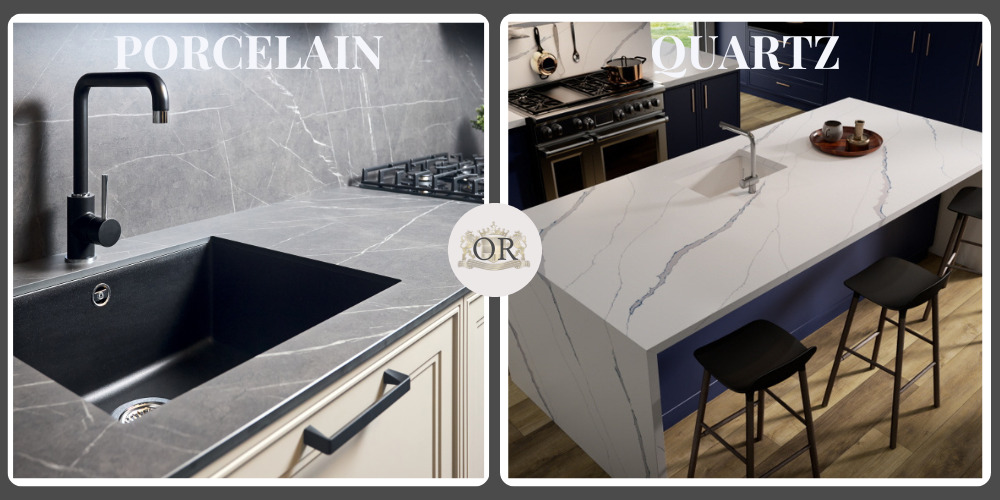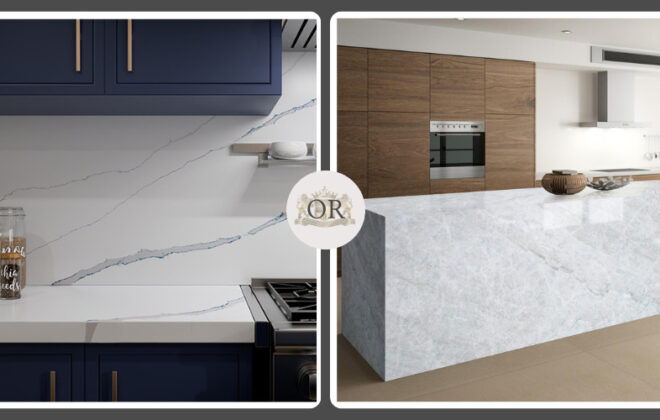Porcelain vs. Quartz Countertops: Decoding the Differences
When it comes to selecting the perfect countertop material for your kitchen or bathroom, the options can seem overwhelming. Two contenders that often catch the eye are porcelain and quartz. While they share some similarities, they also have distinct characteristics that cater to different preferences and needs. In this in-depth comparison, we’ll explore the differences between porcelain and quartz countertops, helping you make an informed choice for your space.
1. Composition and Manufacturing:
Porcelain Countertops: Porcelain countertops are crafted from a mixture of clay, minerals, and pigments. The material is fired at extremely high temperatures, resulting in a dense and non-porous surface. This manufacturing process creates a material that is highly durable, heat-resistant, and capable of imitating the appearance of natural stone.
Quartz Countertops: Quartz countertops, on the other hand, are engineered using a combination of natural quartz crystals, resins, and pigments. This results in a non-porous surface that is highly resistant to stains, scratches, and impacts. The engineered nature of quartz allows for a wider variety of colors and patterns, including ones that mimic the look of natural stone.
2. Appearance and Aesthetics:
Porcelain Countertops: Porcelain countertops often replicate the appearance of natural stones like marble or granite, thanks to advanced printing technology. They offer a sleek and contemporary look with consistent patterns. However, some purists might still prefer the genuine variations found in natural stone.
Quartz Countertops: Quartz countertops offer a broad range of colors and patterns, both contemporary and classic. Manufacturers can precisely control the appearance of quartz surfaces, creating consistency in color and veining. This is ideal for those seeking a specific aesthetic for their space.
3. Durability and Resistance:
Porcelain Countertops: Porcelain is known for its exceptional durability. It is resistant to heat, stains, scratches, and UV light. This makes it suitable for both indoor and outdoor use. Porcelain’s resilience against extreme temperatures and its non-porous nature contribute to its long-lasting appeal.
Quartz Countertops: Quartz is also highly durable and offers excellent resistance to scratches, stains, and impacts. However, it is important to note that quartz can be sensitive to high heat, so using trivets or hot pads is recommended to avoid damage.
4. Maintenance:
Porcelain Countertops: Porcelain is relatively easy to maintain. Regular cleaning with mild soap and water is usually sufficient to keep it looking clean. Its non-porous surface prevents the growth of bacteria and molds.
Quartz Countertops: Quartz’s non-porous nature makes it easy to clean and resistant to staining. It doesn’t require sealing, but routine cleaning is essential to maintain its appearance.
5. Cost Considerations:
Porcelain Countertops: Porcelain countertops can be more expensive to install due to the extra labor it requires and installation complexity. However, their durability and longevity can make them a worthy investment.
Quartz Countertops: Quartz countertops are generally less expensive to install compared to porcelain, making them a more budget-friendly option.
In Conclusion:
Choosing between porcelain and quartz countertops comes down to your design preferences, lifestyle, and budget. Porcelain offers the allure of mimicking natural stone with exceptional durability, while quartz provides a wide array of colors, patterns, and enhanced resistance. Both materials offer unique benefits, ensuring that you can find the perfect countertop solution that aligns with your aesthetic vision and functional requirements.
Related Posts
Recent Posts
- Trends in Kitchen and Bathroom Design: Popular Stone Choices for 2023
- Choosing the Right Natural Stone for Your Countertops: A Buyer’s Guide
- A Guide to Keeping Your Quartz Countertops Sparkling Clean
- Porcelain vs. Quartz Countertops: Decoding the Differences
- The Timeless Elegance of Granite Countertops: A Comprehensive Guide
Categories
- Design (2)
- Granite (3)
- Inspiration (1)
- Natural Stone (2)
- Porcelain (2)
- Quartz (4)
- Quartzite (2)
- Style (1)
- Tips & tricks (3)



